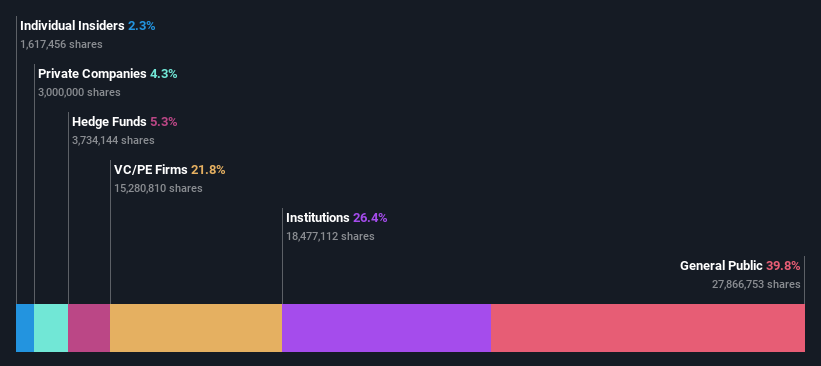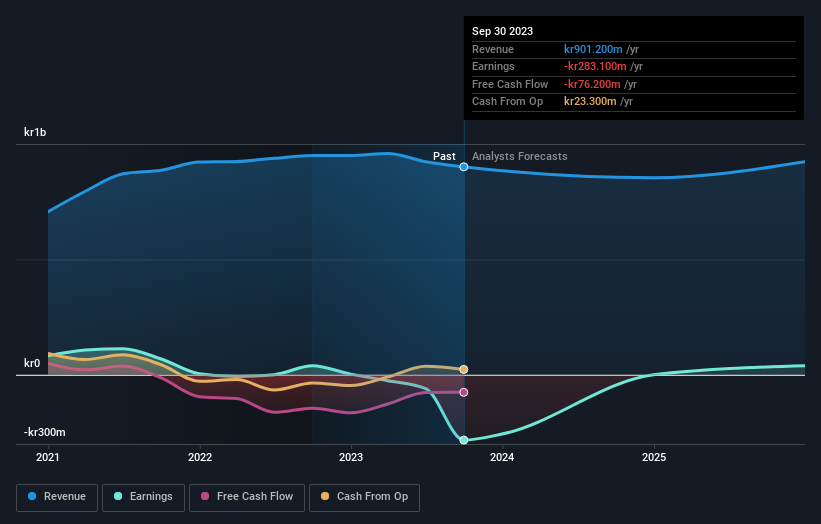- Sweden
- /
- Electrical
- /
- OM:CTEK
Institutions profited after CTEK AB (publ)'s (STO:CTEK) market cap rose kr129m last week but individual investors profited the most

Key Insights
- Significant control over CTEK by individual investors implies that the general public has more power to influence management and governance-related decisions
- 50% of the business is held by the top 6 shareholders
- Institutional ownership in CTEK is 26%
If you want to know who really controls CTEK AB (publ) (STO:CTEK), then you'll have to look at the makeup of its share registry. We can see that individual investors own the lion's share in the company with 40% ownership. That is, the group stands to benefit the most if the stock rises (or lose the most if there is a downturn).
Following a 11% increase in the stock price last week, individual investors profited the most, but institutions who own 26% stock also stood to gain from the increase.
Let's take a closer look to see what the different types of shareholders can tell us about CTEK.
See our latest analysis for CTEK

What Does The Institutional Ownership Tell Us About CTEK?
Institutional investors commonly compare their own returns to the returns of a commonly followed index. So they generally do consider buying larger companies that are included in the relevant benchmark index.
CTEK already has institutions on the share registry. Indeed, they own a respectable stake in the company. This suggests some credibility amongst professional investors. But we can't rely on that fact alone since institutions make bad investments sometimes, just like everyone does. It is not uncommon to see a big share price drop if two large institutional investors try to sell out of a stock at the same time. So it is worth checking the past earnings trajectory of CTEK, (below). Of course, keep in mind that there are other factors to consider, too.

It looks like hedge funds own 5.3% of CTEK shares. That worth noting, since hedge funds are often quite active investors, who may try to influence management. Many want to see value creation (and a higher share price) in the short term or medium term. Investment AB Latour (publ) is currently the largest shareholder, with 22% of shares outstanding. With 9.8% and 6.1% of the shares outstanding respectively, Fourth Swedish National Pension Fund (AP4) and AMF Fonder AB are the second and third largest shareholders.
We did some more digging and found that 6 of the top shareholders account for roughly 50% of the register, implying that along with larger shareholders, there are a few smaller shareholders, thereby balancing out each others interests somewhat.
Researching institutional ownership is a good way to gauge and filter a stock's expected performance. The same can be achieved by studying analyst sentiments. While there is some analyst coverage, the company is probably not widely covered. So it could gain more attention, down the track.
Insider Ownership Of CTEK
The definition of company insiders can be subjective and does vary between jurisdictions. Our data reflects individual insiders, capturing board members at the very least. Company management run the business, but the CEO will answer to the board, even if he or she is a member of it.
Insider ownership is positive when it signals leadership are thinking like the true owners of the company. However, high insider ownership can also give immense power to a small group within the company. This can be negative in some circumstances.
We can see that insiders own shares in CTEK AB (publ). As individuals, the insiders collectively own kr31m worth of the kr1.3b company. This shows at least some alignment, but we usually like to see larger insider holdings. You can click here to see if those insiders have been buying or selling.
General Public Ownership
The general public-- including retail investors -- own 40% stake in the company, and hence can't easily be ignored. While this group can't necessarily call the shots, it can certainly have a real influence on how the company is run.
Private Equity Ownership
With an ownership of 22%, private equity firms are in a position to play a role in shaping corporate strategy with a focus on value creation. Some investors might be encouraged by this, since private equity are sometimes able to encourage strategies that help the market see the value in the company. Alternatively, those holders might be exiting the investment after taking it public.
Private Company Ownership
We can see that Private Companies own 4.3%, of the shares on issue. Private companies may be related parties. Sometimes insiders have an interest in a public company through a holding in a private company, rather than in their own capacity as an individual. While it's hard to draw any broad stroke conclusions, it is worth noting as an area for further research.
Next Steps:
It's always worth thinking about the different groups who own shares in a company. But to understand CTEK better, we need to consider many other factors. Be aware that CTEK is showing 2 warning signs in our investment analysis , and 1 of those doesn't sit too well with us...
If you would prefer discover what analysts are predicting in terms of future growth, do not miss this free report on analyst forecasts.
NB: Figures in this article are calculated using data from the last twelve months, which refer to the 12-month period ending on the last date of the month the financial statement is dated. This may not be consistent with full year annual report figures.
New: AI Stock Screener & Alerts
Our new AI Stock Screener scans the market every day to uncover opportunities.
• Dividend Powerhouses (3%+ Yield)
• Undervalued Small Caps with Insider Buying
• High growth Tech and AI Companies
Or build your own from over 50 metrics.
Have feedback on this article? Concerned about the content? Get in touch with us directly. Alternatively, email editorial-team (at) simplywallst.com.
This article by Simply Wall St is general in nature. We provide commentary based on historical data and analyst forecasts only using an unbiased methodology and our articles are not intended to be financial advice. It does not constitute a recommendation to buy or sell any stock, and does not take account of your objectives, or your financial situation. We aim to bring you long-term focused analysis driven by fundamental data. Note that our analysis may not factor in the latest price-sensitive company announcements or qualitative material. Simply Wall St has no position in any stocks mentioned.
About OM:CTEK
CTEK
Provides battery charging products for all types of vehicles in Sweden, Nordics, DACH, the Americas, rest of Europe, and internationally.
Excellent balance sheet with reasonable growth potential.

